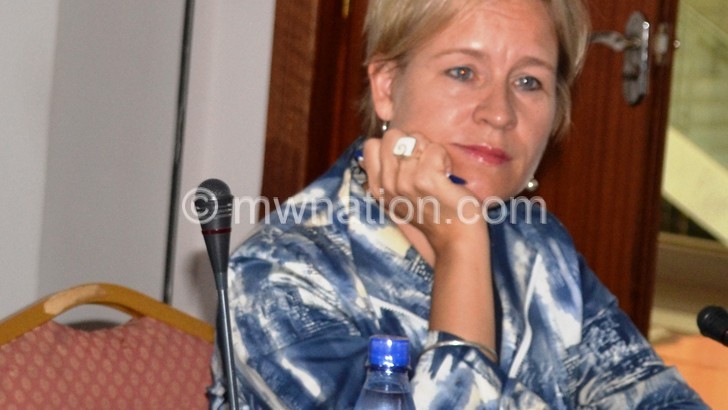‘Malawi’s progress on development is slow’
The United Nations (UN) Resident Coordinator Mia Seppo believes Malawi has no business in a category comprising countries that at one time or another experienced war. Speaking during the launch of the 2016 Human Development Report (HDR 2016) whose index has ranked Malawi 170 out of 188 the UN-recognised countries and territories she said in a fast changing world, there is need for Malawi to change not only in the pace but also the quality of development that is taking place. In this interview, our reporter TINENENJI CHALANDA talks to SEPPO on why Malawi’s current ranking on the HDI should be of concern. Excerpts:

First, tell us what the HDI is and what it measures?
The Human Development Index is an integrated measure of three dimensions of human well-being, namely health [as measured by life expectancy], education [as measured by expected years of schooling and mean years of schooling] and a decent standard of living [measured by the per capita gross national income, GNI in United States dollars]. The HDI marked a significant departure from the practice of capturing the development progress only through monetary measures such as increases in gross domestic product [GDP]. Aspects of people’s wellbeing are not captured in GDP and it was recognised that using only a monetary measure did not provide a true assessment of a country’s development trajectory.
Why is it important to look at the human aspect of development?
United Nations Development Programme’s [UNDP] human development approach was developed in 1990 by Economist Mahbub Ul Haq, building upon Nobel Laureate Amartya Sen’s seminal work on human capabilities. This approach is about improving the lives people lead and the freedom of choice to live the lives they value. Let me illustrate: A human being needs to be well fed, healthy and have shelter and do work, study, vote, socialise etc.
How does human development relate to economic development?
The human development approach calls for addressing concurrently the economic, social and recently also environmental aspects of development. It considers economic growth a necessary but not sufficient condition for development. Economic growth is a means and not an end for sustainable development. The 1996 Human Development Report explored the link between economic growth and human development and concluded that there is no automatic link between the two but when these links are forged with policy and determination, they can be mutually reinforcing and economic growth will effectively and rapidly improve human development.
It is commonly seen that many countries have a higher GNI per capita, but are low on human development indicators. Malaysia ranks in the middle human development category despite having a higher GNI as compared to Chile which is placed in the high human development category, just because it performs much better on health and education. Let’s compare Malawi and Mozambique; neighboring countries, both in the low human development category. While Mozambique has a slightly higher GNI per capita at $1 098 as compared to Malawi at $1 073; it performs much lower than Malawi on the health and education dimensions and hence has a lower HDI and ranking than Malawi. Ideally economic growth should lead to fuller choices or opportunities for all people rather than many choices for a few.
Why should Malawi’s current ranking on the HDI be of concern?
In the last 25 years, Malawi’s progress on the HDI has been extremely slow. It continues to feature in the low human development category and is amongst the poorest countries in the world. With an HDI rank of 170, it ranks in the bottom 20 countries and importantly is the only peaceful country to be so poor.
Between 1990 and 2015, Malawi’s HDI value increased from 0.325 to 0.476; its life expectancy at birth increased by 20.1 years, mean years of schooling increased by 1.9 years and expected years of schooling increased by 5.4 years. However, Malawi’s GNI per capita decreased by 27.2 percent between 1990 and 2015. This certainly is a matter of concern particularly when you consider its rich agro- economic potential and its relatively young population.
What do you think should be done?
National policy should not only focus on maximising economic growth but also simultaneously address equity, environmental quality and public participation, to ensure that people have the necessary capabilities, full opportunity and freedom of choice. Malawi has yet to fully exploit its opportunities and leverage its potential. Unfortunately, we are witnessing rising inequality and deprivation in Malawi. The gap between the rich and the poor, the haves and have-nots, in education health, access to land and income generating opportunities is widening. And where inequality exists other social ills follow; it breeds corruption which hollows out the socio-economic foundations of a country.
What should Malawi Government do to improve development?
For Malawi investing in human capital development makes economic sense; strengthening the two pillars of human development, education and health will lead to development of the country’s greatest asset, its people, turning them into a skilled and healthy workforce necessary for wealth creation and sustainable development.
Looking ahead as the country prepares its next national development strategy, the MGDS III, strategic investments in enhancing quality of education both at secondary and tertiary levels and greater focus on nutrition and stemming population growth are vital to ensure inclusive socio-economic development.
It is equally important to create an environment and policy framework that ensures that no one is left behind and that appropriate redistributive policies ensure that resources are directed at those who need them the most. One of the best entry points to do this is strengthening gender equality, which is a multiplier to catalyse economic and social development.





